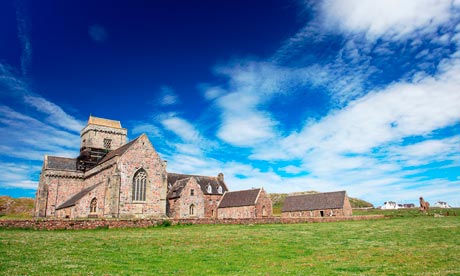
Peter Stanford, author of Heaven: A Traveller's Guide to the Undiscovered Country, is in slightly less celestial surroundings in The Extra Mile, wherein he travels to some of the most famed holy sites in the British Isles to discover whether any of the essence remains that in centuries past compelled pilgrims to visit them.
The loss of this intangible quality is not a recent development. In 1512, Erasmus found Walsingham objectionable, thronged with salespeople flogging ecclesiastical souvenirs such as bottles of the Virgin Mary's breast milk. Five hundred years later, though the fake breast milk has moved on, Stanford feels similar aversion, the Norfolk shrine's reputation obliterating its spiritual history.
The combination of Christianity and commerce is of particular distaste to Stanford, "a cancer at the heart of contemporary Catholicism" – so it's no surprise that he cleaves to those sacred sites where simplicity prevails. Islands are a favourite. Even with transportation at a modern pilgrim's disposal, they are difficult to get to; their geographical separation naturally protects them from the vagaries of the rest of society, and of mainstream religion. Iona "has been remote from the centres of power and influence and affluence, thus preserving an ancient sensibility that might otherwise have given way to industrialisation, commercialisation and precisely the modern pressures that many now come here to escape from". The same could be said of Bardsey Island off the Welsh coast, beneath whose 450-acre surface 20,000 saints are supposedly buried. Stanford later joins a group of cross-carrying pilgrims to squelch barefoot across the mudflats to Lindisfarne. The effort of the journey, he says, "makes the spiritual tangible", as well as sublimating the flesh in a more productive manner than hair shirts and self-flagellation.
Water is a recurring theme. Healing waters, such as at Saint Winefride's Well at Holywell, are a familiar notion; well-dressing, not so much. This annual tradition, upheld in villages in Derbyshire and Cheshire, offers thanks to the wells with tableaux painstakingly made with petals, dried pulses and coffee beans stuck into clay; the practitioners seem scarcely less puzzled by the custom than Stanford is. He is more tolerant towards weirdness in Glastonbury, where self-proclaimed witches and pagans celebrate spirituality with such infectious gusto that Stanford even finds himself wondering whether ley lines exist, before checking himself sharply.
A former editor of the Catholic Herald, Stanford's real triumph is that his own faith does not become a prominent feature of the exercise. In the places where he does find religious significance, it transcends doctrine and creed.

